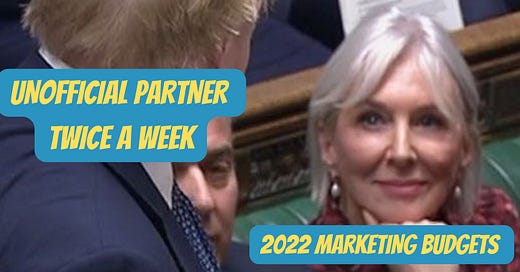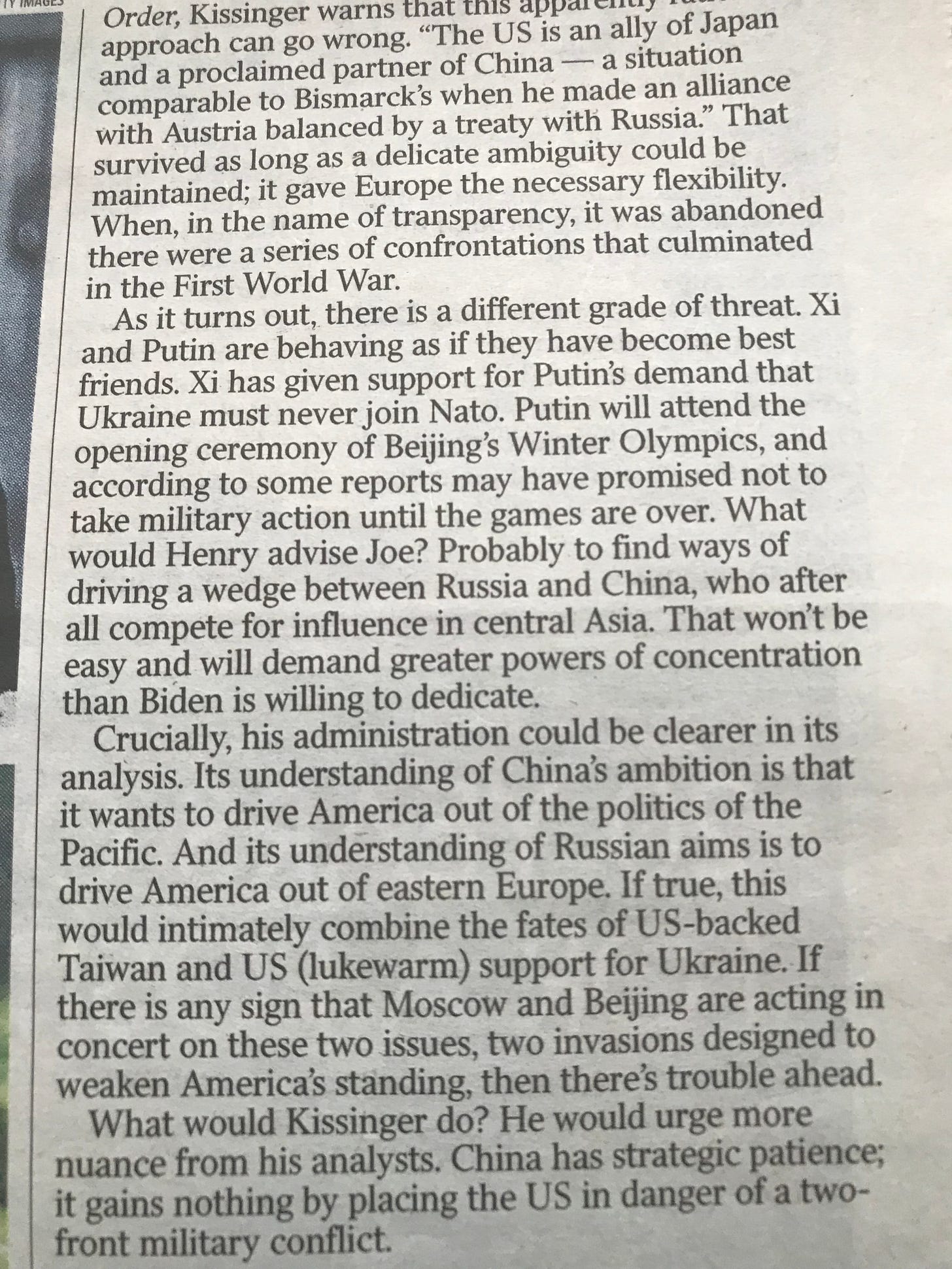$1billion in 3 hours: Inside the BT Sport fire sale; Abraham Maslow's guide to NFTs; Olympics as war room; Spoiler alert, Golfers really like money; The business of gegenpressing
The newsletter of the podcast
3 hours to find a billion dollars: how BT Sport went to Discovery
So, DAZN misses out on BT Sport.

UP Sources tell me this morning that DAZN are very disappointed with the outcome, and the process.
They claim DAZN’s final bid had been accepted by the BT Board.
Then Discovery countered, doubling their bid and effectively giving DAZN three hours to go from $1bn to $2bn.
At that point, the Len Blavatnik backed DAZN declined to re-bid.
What do you buy when you buy BT Sport?
The question has been asked a few times on The Bundle and the answer is still quite hard to discern.
There’s a well worn trope that BT Sport’s Premier League rights are a Trojan horse in to relevance for two broadcasters - Discovery Eurosport and/or DAZN - who lack definition in the important UK marketplace.
We’ll see. It didn’t work for BT.
Claire Enders was early to BT Sport’s problems on UP107.
But does Abraham Maslow’s hierarchy of needs still work on a wet Tuesday at Stoke?
Tomorrow’s podcast is a conversation about value, with Mike Brady and Ben Phillips of InfrontX.
Specifically, what is the value exchange between a football club and a fan, particularly when the relationship is conducted almost entirely via digital channels.
There’s a reference to this model below, created by the Bain consultancy, which takes Maslow and points it at marketing.
InfrontX took this Maslow/Bain framing and applied to the thorny topic of fan engagement in sport.
Spoiler: Most sports rights holders do what’s easy and cheap.
What they found was an over abundance of information being fed to fans, see bottom right of the pyramid above.
This feels true: Club-as-content-hub, building out social teams that aggregate ‘news’ and repost via social channels and CRM with varying degrees of creative success.
The promise v reality of tokenisation
Then you lay the current crypto-trading-as-fan-engagement boom in to the model.
This promise one element of value:
While delivering another:
But the money being made is not by the fans, it’s by the club via the partnership deal and by currency speculators using fans as liquidity.
See also: add this to your growing pile of understanding web3 pieces.
See also: Roger Mitchell’s pod, which is an excellent explainer.
The match that football struggles to get right: Product v Customer
The original Bain work suggests that elements of value framework should have an organizational dimension as well.
One pay-TV executive, lamenting the success of Netflix, told us, “I have a lot of people working on product features and service improvements, but I don’t have anyone really thinking about consumer value elements in a holistic manner.”
It’s a nice idea. But the usual response from football’s marketing and commercial teams is, ‘Can’t talk about this yet, we’ve got a game on Saturday’.
Meanwhile, for those lucky enough to get in the stadium, this year’s Super Bowl ticket rate card might be a vision of the future (HT @ochocinco). Is it real do we think?
A dictator’s guide to the Winter Olympics
The Beijing Winter Games set off tomorrow.
Bloomberg took a look at President Xi’s Olympic guest list.
Of the 21 world leaders at the opening of the Winter Olympics tomorrow, most preside over non-democratic regimes. Twelve including Putin, rule nations labeled either "authoritarian" or "hybrid regime" in the EIU Democracy Index. Another eight leaders head democracies. There's also Monaco—which wasn't rated.
The ice hockey takes place at the Wukesong Sports Centre, the ideal venue from which to plan the invasion of Ukraine.
This was tucked away in (an excellent) piece on Henry Kissinger in last weekend’s Times:
It’s been done before: Putin invaded Crimea the day after the Sochi Winter Games in 2014.
As Mark Dreyer put it in last week’s Inside Beijing podcast (UP221), the role of sport to impact China and the CCP is absurdly overblown.
‘Politics comes first, business is a long way second. Sport? It hardly registers’.
For the IOC however, the idea of sport as change agent is very good business.
And the Winter Games is a surprisingly big earner for the IOC.
Ed Warner puts it this way:
Under half the number of competing nations, a quarter of the athletes, a third of the medals. But two thirds of the global TV viewing figures, so enough to keep both broadcasters and sponsors happy in the lull between Summer Games.
Warner, former chair of UK Athletics, says the money has made the IOC complacent but that there’s much more to be wrung out of the rings.
He paints a picture of the global market as a carve up between the two great global super brands of the Olympic Rings and FIFA.
Ed Warner: …if FIFA is determined to move to biannual football World Cups, why not fight fire with fire and aim for every other year to be considered a fully-fledged Olympic one?
And then.
This magnetism of the five rings is the IOC’s opportunity to take a big leap forwards, to include more sports, mint more medals, snaffle a greater share of the global broadcast and sponsorship cakes.
This could only happen if the IOC was bold enough to break the Games out of their two short bursts of sporting action within each four year cycle. Beef up the Winter Olympics by adding a cluster of indoor sports. Add a thematic Games or two - Urban Olympics and a Combat Olympics anyone? An e-Olympics too?
So, more is more. Whatever happened to the value of scarcity?
Golf comms lines: Think of the children v Using the Saudi/Greg Norman disruptor moment to make shedloads of cash
Beware golfers bearing promises to grow the game as a justification for trousering millions in appearance fees.
Phil Mickelson told Golf Digest that it’s the PGA Tour’s ‘beyond obnoxious’ greed over its handling of media rights.
“It’s not public knowledge, all that goes on,” Mickelson said. “But the players don’t have access to their own media. If the tour wanted to end any threat [from Saudi or anywhere else], they could just hand back the media rights to the players. But they would rather throw $25 million here and $40 million there than give back the roughly $20 billion in digital assets they control. Or give up access to the $50-plus million they make every year on their own media channel.
“There are many issues, but that is one of the biggest,” he continued. “For me personally, it’s not enough that they are sitting on hundreds of millions of digital moments. They also have access to my shots, access I do not have. They also charge companies to use shots I have hit. And when I did ‘The Match’—there have been five of them—the tour forced me to pay them $1 million each time. For my own media rights. That type of greed is, to me, beyond obnoxious.”
Enter here a conversation about blockchain as the answer to Big Phil’s woes. The star milking the fan direct, bypassing the rentier class of the tours.
See also, Big Phil:
But the disruption threat is real, and pushing hard on the key strategic weakness of the tours, which is the product is meh, even to those who play it. And because the tours exist to serve the players (members) rather than the audience, the threat will remain.
John Huggan had a damning quote on golf as an entertainment product from Lee Westwood:
“I've signed an NDA. But from my perspective, you can ask [wife] Helen, when I'm at home I watch a lot of sport but not a lot of golf. The only time I watched the Masters was when Tiger won in 2019. And even then, I only watched the back nine on Sunday. I wasn't really interested in Days 1, 2 an 3. So golf has to move with the times and become more heat-of-the-moment, volatile and impactful right from the word go. A team aspect gives you that. There’s more action happening in more places.
Strat du Jour: Moneyball + Germanic Efficiency
Italian club Genoa was the story of the January transfer window.


The key bit of information is that Genoa was bought by 777 Partners last month.
See the background on this from former Sportcal news editor Jon Rest, who now runs Transfer Room’s content):
777 Partners holds a stake in Spanish club Sevilla FC, while its sports, media and entertainment portfolio also includes streaming service Fanatiz, sports rights marketing agency 1190 Sports and Atalanta Media, a media distribution platform dedicated to women's football.
A newly American owned European club hiring a new German or Austrian coach and buying uber fit, young (and cheap) players to do the geggenpressing thing: Sound familiar?
It will if you heard Paul Conway on UP193 (episode 7 of our ReThinking Sport collaboration with Portas Consulting).
The head of Pacific Media Group (owner of Barnsley and seven other European clubs), is advising fellow US multi-club soccer investors 777 Partners, and the Conway influence is clearly visible.
Three quotes from that conversation with Conway stick with me, and offer a 3 point guide to 777 or anyone else investing in football:
Be present
Sometimes you get your cash stolen. As simple as that. There's been multiple situations of Americans going into Italy and they don't own the players they thought they owned. But it all gets back to, and this is common in most other industries, if you're not there, it's probably going to go wrong. This will just continue to happen. The sector will continue to consolidate mainly led by Americans. The only reason it's just Americans is because they just look at the value arbitrage from investing in the MLS, where recent transactions are 12, 13 times revenue.
Have a plan
We have a very specific strategy. When we meet clubs we basically say, all right, this is our strategy: We play with a young team; We believe in an academy, we balance our budget; We don't run up losses and we play with a high press. Do you share that vision?
It's just like any other industry, if you do, we're there. We're your partner. If you don't, it doesn't work. That's what we do throughout Europe, we just have these very direct conversations.
Find a German
We didn't want to get into the whole system of: sign a player, assign a manager that manager wants to bring their own players, that manager leaves, those players have to go.
So then we stepped back and said, all right, what's the best style to play for a teams full of really young, energetic players. And it just naturally it was a high press.
There's a reason why most of our managers are German speaking because that pressing style of play is more ingrained in Austrian and German football. It's really hard for us to find, for example, in England, a British manager that's dedicated to it, because you can see it in the stats. You can see sometimes a manager says: oh, Man City and Liverpool are into it, so I'm going to try it for a season. But then you can see in the data that they give it up, maybe after a season. So we really need people that are dedicated to this through thick and thin, because if we lose five matches in a row, because the whole recruiting is based upon the style of play. We don't want the manager to say, oh, we're going to play long ball for the rest of the season, because then everything falls apart.
The Bundle follow up: Yannick’s guide to Platform economics
The conversation in last week’s podcast used Apple as a way in to talking about alternative models of calculating ROI from sports rights.
Yannick took this and ran with it.



A PickGuru freebie for UP readers
This week’s podcast was on the launch of PickGuru, the new social gaming app.
Founder Oli Slipper, CEO Olly Roland-Jones and the company’s cricket guru, Nick Compton talked about the intersection of the market where fantasy leagues, social media, private networks and gaming intersect, plus the lack of innovation in a consolidated betting industry and the role of performance data in cricket.
PickGuru have created a free to play Unofficial Partner mini league.
Enter the code: XKHA-20569-WKWJK
Deadline 5pm this Friday.
Good luck.











